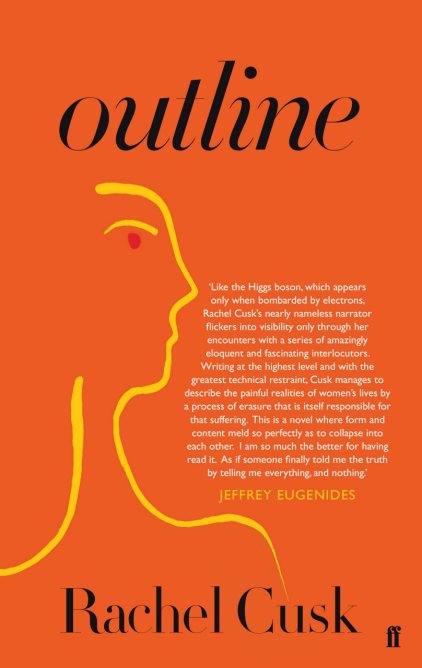 I am the ideal audience for this book, frequently bored with the tyranny of representation, with a deep-seated impulse towards the possibilities in fiction for silence and emptiness. Any serious reader of Beckett knows of the demands made when a writer is seducing readers to follow on a path towards silence. Rachel Cusk’s Outline propels away from representation and towards silence, towards something beyond plot and narration.
I am the ideal audience for this book, frequently bored with the tyranny of representation, with a deep-seated impulse towards the possibilities in fiction for silence and emptiness. Any serious reader of Beckett knows of the demands made when a writer is seducing readers to follow on a path towards silence. Rachel Cusk’s Outline propels away from representation and towards silence, towards something beyond plot and narration.
Something different is happening with the idea of ‘the narrator’ in Outline. By scarcely defining her narrator–it is jarring three-quarters of the way into the story when we learn the narrator’s name–Cusk leaves a reader with only the scantiest idea of whose eyes we are observing from. Without a typical character-narrator– a propelling force–without an identity to assume, Cusk makes the form take on the steering of its own discourse. Occasionally it teeters under the weight of its own structure, but Outline is nevertheless one of the most fascinating novels I’ve read in years.
Cusk opens up all sorts of ideas about how we define ourselves in telling another of our experience, of the trauma of our lives. She writes, “Yet there was something worse than forgetting, which was misrepresentation, bias, the selective presentation of events . . .” That may be true, yet how do we step outside ourselves sufficiently to rise above our partisan and polemical perspectives? This seems at the heart of what Cusk is addressing, especially as she has said elsewhere, “Autobiography is increasingly the only form in all the arts.”
The quest to gain enough distance to tell all sides of a story, to hear all sides of a story and not only what we can relate to is perhaps a logical path to follow Cusk’s Aftermath, which felt like an inevitably evasive and one-sided account of her divorce. Though Cusk’s writing suggests movement from character to author-surrogate, Outline adopts a new form to the purely autobiographical Aftermath, which explored similar subjects, though from the obverse side of the mirror. Outline is a more radical innovation using an indefinite voice, deprived of time and purpose. It questions its own being and its way of relating to the world. It will be intriguing to see where Cusk takes this self-exploration in the sequel Transit and the reported last part of the trilogy.

I’ve got both of these in my reading pile, so look forward to them. I’ve heard Rachel Cusk described as one of the most hated women writers in England, but I’ve always enjoyed her careful, precise enunciation of problems. Mind you, her ‘characters’ (even in her autobiographical books like Aftermath and A Life’s Work) are quite slippery creations and I think it’s wrong to believe they are 100% accurate representation of self, since self, she shows us, is constantly being redefined.
I’ve heard she’s acquired that hatred with the Mumsnet Mafia. Is it more prevalent? It doesn’t surprise me in a way. The books are demanding. There’s not much to grasp on to in the way of sympathy. Many readers resist that. Self, identity: these are tricky notions, not fixed but slippery themselves. I like that Cusk works in that territory.
With mums, with husbands and married woman (for Aftermath) and the chatterati for exposing a certain lifestyle and some friends in her book about a summer in Italy.
The pulped novel. I shall have to track one of those down. In truth, I’ll likely read every word she’s written. Such an intellect is impossible to ignore.
In a way, there isn’t a narrator at all in the sense of moving a narrative forward through discourse. What Cusk is doing to form here is very interesting and am fascinated to see where she takes this trilogy.
I loved Outline – I was very happy that she was able to publish it, because it struck me (while reading) that it was the kind of book that only a writer with a solid career behind her could get published, and it felt brave to me for several reasons. I love what you’ve written about it.
Brave in many ways; I could have picked any number of themes but chose those I relate to most closely as it seemed somehow appropriate. Have you read Transit yet? I’m excited to know this is a trilogy. I plan to read through Cusk’s backlist, and recall you found some of it problematic?
The first Cusk I read was The Lucky Ones, and I thought it was excellent. I loved the precision of her writing, the way she approached character. And then I read Arlington Park and had a lot of trouble with it, but I think it was me, I think I wasn’t quite ready to read that book and understand the anger in it. I need to read it again. After that I’ve only read Outline and Aftermath. I have not read Transit yet, and had no idea it was part of a trilogy! With which ones?
Transit picks up loosely from where Outline finishes, and there is to be a third to follow.
Oh,that’s exciting. I can’t wait to read it now.
Oh I like the sound of this! Does Aftermath have to/should be read first?
No. it is unrelated.